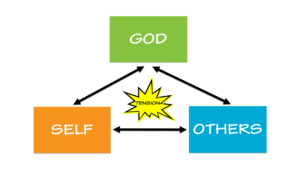I remember watching the TV sitcom Alice in the mid 70s when I was growing up. I watched it a few times a week for many years. An actor named Vic Tayback played Mel Sharpels, the owner of a greasy spoon diner in Phoenix. One of the episodes I can still remember is when Mel turned 50 years old and they had a surprise roast party for him. A roast, if you don’t know, is where they mock you, but it is because they all know you so well and love you so much.
During the roast, Mel looks like he is sad, and then, when everyone is done roasting him, and it’s his turn to speak, he is very upset with all of them for being so disrespectful to him, and he leaves the room. Everyone in the room is floored when he does this. They look around at each other, horrified that something they intended to express love was taken the wrong way. A few moments later, Mel bursts back into the room saying, I was only kidding! This is the best party I have ever had! You guys are the best friends ever!
When I watched this episode as like a 9 or 10 year old boy, I remember thinking how old 50 sounded. My parents were still in their mid-thirties at that time. I tried to imagine what my life would be like when I turn 50. Would I look old like Mel did? Would I be working at a dead-end job? Would I have good friends who would want to throw me a roast birthday party? What idiosyncrasies might they roast me about?
I will be turning 50 in a couple months. It’s a marker event for me and I take marker events to heart. I have cried at every kindergarten drop off, 5th grade moving on, jr high graduation, high school graduation, college graduation, kids marriage and grand baby (Only one of those so far 🙂 ).
I ran and hid in the Philippines so no one would throw me a surprise 40th party, and I have asked everyone to promise not so throw me a surprise 50th. To me it seems like a popularity contest. An event to only remind me of my limited circle of good friends. I hope to spend it with my immediate family, but I don’t have much interest in anything beyond that.
I grew up in a house without a loving marriage, with two pretty dysfunctional extended families on either side. There was a lot of love, but people had to express it through some pretty broken lives. As a result, often times, it didn’t come out right, and the brokenness of their lives got the better of them. I remember as young as 7 years old thinking to myself, that when I grow up, I am going to really love my wife, and give that to my kids as a gift. I knew first hand how bad it hurts when your parents don’t love each other. I was determined to never abuse substances, and never allow relationships to deteriorate to the point of no return.
My childhood really shaped me and set the course for my future – good and bad. I was mostly able to leverage the bad as a foundation for moving forward, although some of the bad is embedded deep inside of me. As a young kid, I was always curious as to what kind of legacy I would leave. I dreamed of being wealthy, successful, not having to worry about money, not have relational strain, not having any difficult situations – just laughing and enjoying the good life with my friends and my large, happy family.
As I honestly assess where I am now, I can say I have experienced a depth of intimacy and love in my marriage, that totally exceeded my already high expectations. Same with my children, adopted children, grand child, etc. The upside has been way better than I could have imagined back then when I was a little boy contemplating my future.
On the flip-side, I had no idea how difficult the downsides would be. I had no idea that, the more I worked to eliminate struggle from my life, and the lives of those I love, the more struggle would work it’s way deep into my life and their lives. I just assumed, back then, that struggle was a result of bad actions, so if you eliminated the bad actions, you would eliminate struggle.
I have found the exact opposite to be true. The more I love, the deeper my faith becomes, the more wisdom I possess, the more I try to make a difference – the more struggle comes into my life. I have profound struggles, minor struggles, and everything in between, with new ones and changing ones all the time. My family and close friends experience the same.
It’s a weird mix. The song that goes, Morning by morning new mercies I see which comes from Lamentations 3:22-23, The faithful love of the Lord never ends! His mercies never cease. Great is his faithfulness; his mercies begin afresh each morning.
I feel like that truth is counterbalanced with Morning my morning new struggles find me, that would be based on Jesus’ words in John 16:33, Here on earth you will have many trials and sorrows.
At 50, I still struggle financially, relationally, professionally, physically, mentally, spiritually. It’s a struggle to choose joy every morning, my faith is a struggle, love is a struggle, keeping a positive attitude is a struggle. It’s all a struggle. My kids have similar struggles, My adopted kids. My good friends. I have done a poor job of eliminating struggle from my life and the lives of those I love.
In fact, part of the positive ways that I have invested in my family and friends invites and creates struggle. Lack of struggle was part of the goal, part of the vision I had for my family and friends, part of the legacy I wanted to leave – and I have failed at that – in fact, the struggles seem to be picking up steam with no end in sight.
I hoped I would have more prosperity, position and power and that I could pass on as a legacy to the family I friends I love so much. In some ways, I am profoundly disappointed that my vision of myself at 50 in terms of prosperity, position and power is so far from what I hoped it would be. I am pretty much an obscure person, with a very limited influence. My life is full of struggles. My legacy – in reality – is really struggle.
Jesus goes on to say in John 16:33, Here on earth you will have many trials and sorrows. But take heart, because I have overcome the world. As I grow older and adjust my life mission and rethink my legacy, maybe that’s the best I can do. Leave a legacy of someone who overcomes struggle.
But the truth is, really overcoming struggle is a huge struggle in itself. I suspect only God can truly overcome struggle. While God is in me for sure, I am not God, and I don’t believe I can fully reach a point where I can say that I have completely overcome my struggles. New ones are coming in too fast, and old ones can evolve like an antibiotic-resistant bacteria.
Maybe my real legacy is struggling to overcome the struggles. I have struggled mightily, and still do. The people who know most of my story know the depth, height and width of my struggles and they are somewhat inspired by my ability to carry on with a mostly positive outlook. I have my bad days, and I have my doubts, I have some days where I want to quit, and I sometimes even express that out loud.
Most of the time though, I am ready and willing to fight back against the struggle. I am ready to hold my ground, and try to gain new ground against my struggles. Most days, I can feel the power to redeem negative experiences – to see all things working together for good. Most days I am filled with hope, joy and love.
I guess that is what I really want my legacy to be – someone who struggled against the struggles of life – and won – not by eliminating struggles, or completely overcoming them, but by not allowing the struggles of life to overcome me. Not allowing the struggles of life to steal my faith, my joy, my love, or my hope, in the big, overall picture.
I have failed to leave the legacy I dreamed of leaving when I was a little boy watching Alice on TV. But I am not that little boy anymore. The 50 year old me leaves a legacy of struggle. A legacy of struggle AGAINST the inevitable struggles of life.
Struggling well doesn’t mean that you will never lose it, never feel overwhelmed, never feel disappointed in yourself, and you never blow it. It means that your life is not defined by your struggles. When your life is judged at the end, the struggles didn’t get the better of you. You fought them hard, you found them long. You were tenacious in struggling against your struggles.
Yeah. That’s it. TENACITY in the struggle against struggle. That’s the legacy I want to leave.
Thanks Mel Sharpels – Vic Tayback. Thanks for giving a little boy an opportunity to contemplate the bigger picture of life through a silly sitcom.

















